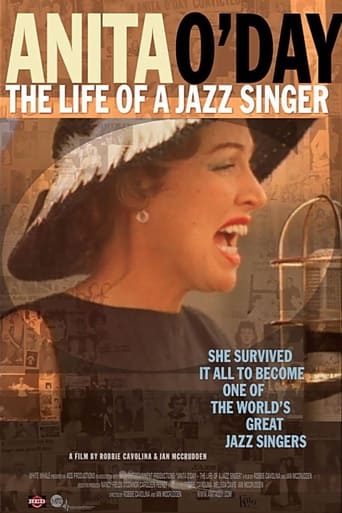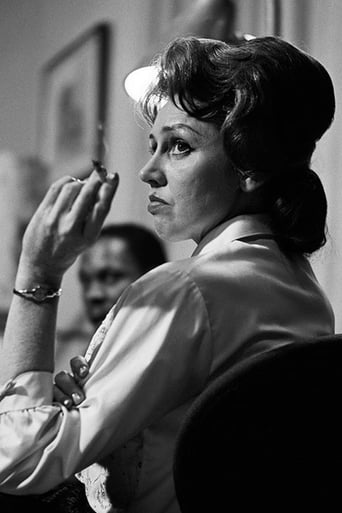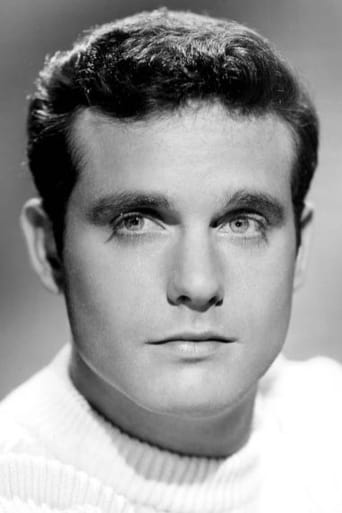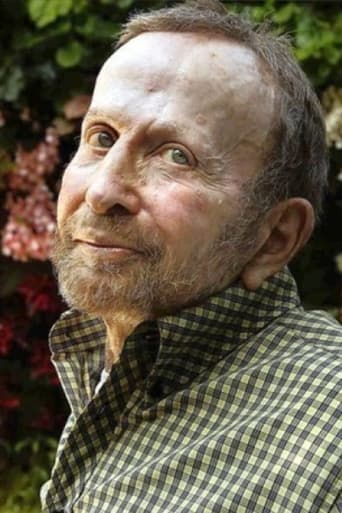

Anita O'Day: The Life of a Jazz Singer (2007)
This documentary explores the life of jazz singer Anita O'Day. As a child, Anita had a tonsillectomy, during which her uvula was accidentally removed. The surgery prevents her from singing vibrato and holding long notes, but lends to her much-revered percussive style. Anita overcomes her vocal hurdle, as well as many others -- including poverty, heroin addiction and jail time for a drug arrest -- to become one of the most prolific and respected jazz vocalists of the 20th century. Initial release: 30 April 2007
Watch Trailer
Cast
Reviews
Touches You
hyped garbage
The performances transcend the film's tropes, grounding it in characters that feel more complete than this subgenre often produces.
At first rather annoying in its heavy emphasis on reenactments, this movie ultimately proves fascinating, simply because the complicated, highly dramatic tale it tells still almost defies belief.
What a great forgotten talent ...the honesty of her life she presents should be a guide post to young talent and celebrities today. Her wit and wisdom...does not take the edge off what she did and how she did .A true breath of fresh air from truly one of the greats. To be truthful in regards to addiction ... Both hers and many of the Jazz greats that were her contemporaries, was insightful and sincere...with her brand of brashness that i am sure was her trademark. To have that long of a career , to play with most of the greatest in Jazz and to survive..is truly indicative of her stamina and stick to it-ness, that keeps her alive in the hearts of those that knew her and discovered her courtesy of this documentary. Anita's look and rebel attitude strikes familiar ....Mylie Cyrus.
I've not seen the documentary in full, but I've seen a lot of the footage that I know to be on it. My comment is mainly about mgconlan's '09 comment about Leonard Feather's comment about Anita being the only white female Jazz singer to equal what we think of as "the big 3" female Jazz singers. I agree with Feather. mgconlan points out other white femmes of note. I'm not that familiar with the Boswells or Bailey. Christy is too cool, too icy. I don't mean that in a bad way, I just find her style limited. In the mid-Seventies I became a fan of Chris Connor. "Lonely Woman" was the first song I heard by her, which is about as "outside" as she got on record. But I collected Bethlehem for her early stuff ( what she was doing in the early Fifties was pretty advanced) and Atlantic, of which I've owned almost all of her releases. I love her, but she is no Anita O'Day. Color being the theme - listening to Ella, she very often sounds white, yet still has the Jazz feel. Anita may sound "blacker" in a sense, but it is more her sense of feeling - this woman could throw some curve balls melodically while fooling around with the time and deconstruct a tune like nobody else. She could really read 'em. I put her up there with the big 3.
You will find it difficult not to enjoy the story of Ms O'Day's life. She was the ultimate survivor; a solid representative of Tom Brokaw's 'Greatest Generation,' sans the uniformed military service. In the documentary she is shown singing a marvelous rendition of Billie Holiday's composition "Travelin' Light," an appropriate choice because they were birds of a feather in so many ways.The major flaw in the documentary comes from the comments of a couple of individuals interviewed in the film - most notably the daughter of pianist Joe Albany - who give the impression that there is a correlation between the musical freedom in modern jazz (aka 'bebop') and the personal mental "freedom" that Ms O'Day and other musicians derived from narcotics use; that is, the narcotics somehow contributed to Ms O'Day's ability or effectiveness in singing in a "freer" modern style. It's understandable how this correlation can be mistakenly made. It is a charge that has plagued jazz musicians since the birth of the music. And, with the prominent number of modern jazz musicians who either did drugs or were alleged to, most noticeably the undisputed leader of modern jazz, Charlie Parker, one can see how easy it is to conclude there must be some truth that the drugs somehow aided the playing.Pianist Joe Albany experienced a similar extended drug addiction as did Ms. O'Day, so I fully respect the opinion of his daughter regarding drug use by musicians during this era. She speaks from the inside. However, it was Parker himself on several well known occasions who dismissed the idea that drug use somehow enhanced or benefited his playing. In addition, there are too many examples of excellent and Hall of Fame level modern jazz musicians who did not succumb to drug use or addiction, yet were able to reach an exceptional playing proficiency.Ms O'Day's drug use seems due more to issues haunting her from her fractured childhood and adult interpersonal relationships as well as the inevitable pressures that come with a career as a public performer, more so than anything having to do with trying to improve her musicianship. Not surprisingly, this is a consistent theme for drug use by all demographic and socio-economic groups, be they jazz musicians or not. For most of these individuals, the "freedom" drugs provide is from the anxieties and pain associated with bad relationships and work and living pressures - the drugs provide no direct aide to learning or playing the music.Performance pressures are often underestimated, but can be insidious. Singer Jeri Southern, for example, suffered deteriorating health from extreme anxiety attacks resulting from her fear of performing in public. Her problem was so overwhelming that at age 35, while still near the height of her popularity, she completely retired from performing and returned home to Nebraska for a more quiet life away from the music performance stage. Maybe an argument can be made that once drugs have been used to suppress the anxieties and pain, the musician is then 'freer' to concentrate on the music unencumbered. Maybe so. But the implication that drug use directly aided in the improved facilitation of the music is inaccurate and should not have been implied in the film with regards to Ms O'Day, since it is a misnomer musicians have been battling for decades. Jazz musicians who took drugs largely did so for the same reasons others in our society took drugs: to suppress anxieties, pressures, and pain brought about by a variety of individual experiences.
The movie didn't need to have anything new about O'Day. It had chronological full film versions of performing,not just clips. I had seen her only in Jazz on A Summer's Day. It was thrilling to see her jiving with Roy Eldrige in Let Me Off Uptown and the commentators remarking how daring it was in 1941 for a white chick and a black guy to be singing together. When you see her performing as opposed to just listening, you catch her femininity, seductiveness, liveliness. I have all her LPs and CDS but seeing them in order on the screen showed her huge body of work. She was incredibly versatile and her style is shown to change and diversify over the years.I have read that the uvula explanation for lack of a vibrato was not true. It was great to hear her explain how she sang, why she used her unique timing. Contrasting with this are the sadness of the tiny trailer she ended up in, having to read the lyrics she used to know and her comment to the effect that she ends up either a singer or a bird without a song. She seems to dismiss the whole body of work that precedes that last CD.I saw her live at the Rainbow Grill in 1994 for 2 shows and despite her being off heroin, she was not doing well at that time with alcohol as I myself witnessed. The multi-colored graphics were great and most of the interviewers interesting although a few more critical ones and less hagiographic ones would have been more interesting.Great film, best singer ever!


